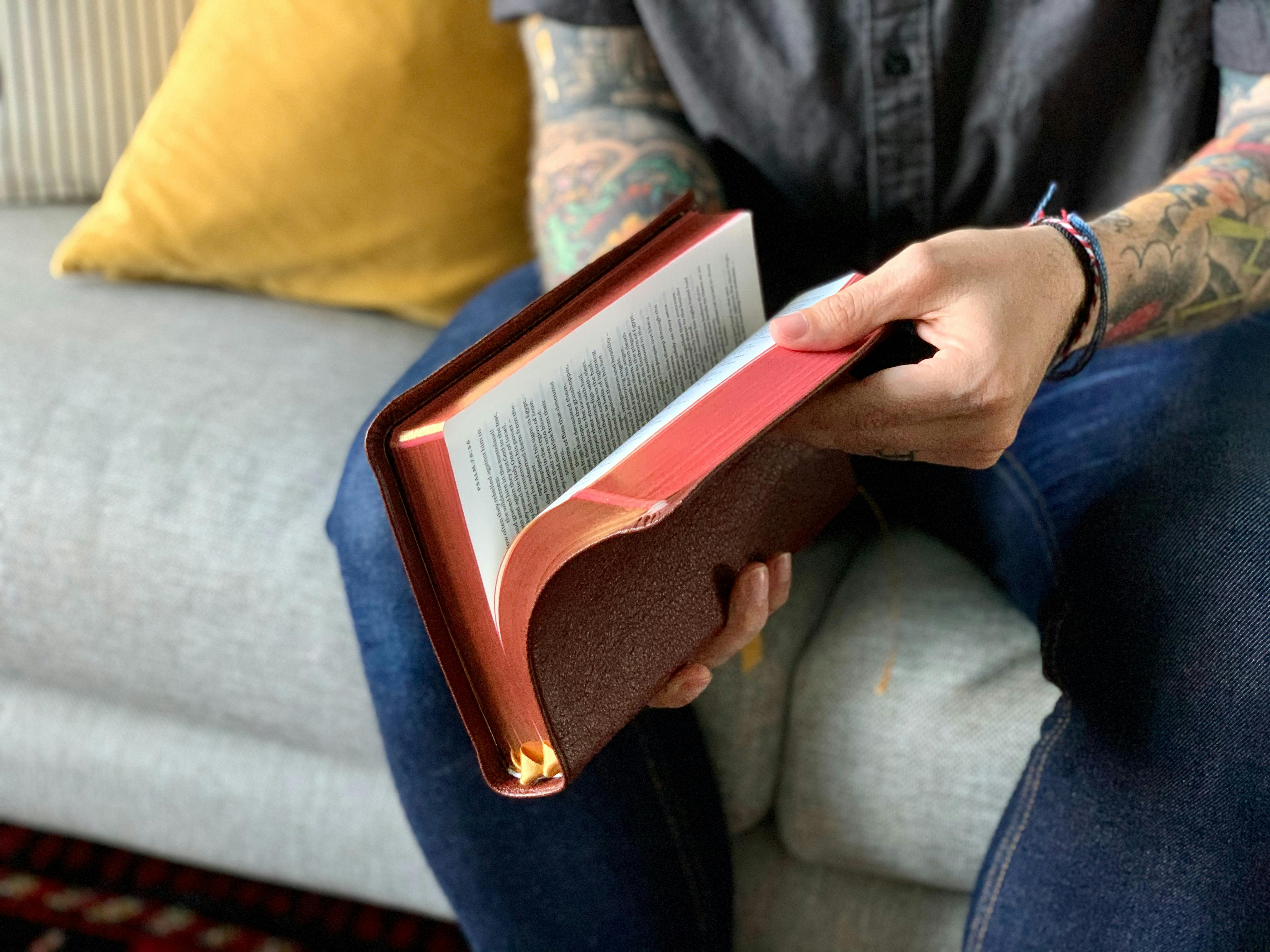What Does God Think About Tattoos? This is a question many people ask, especially those who are religious or considering getting inked. At tattooat.com, we dive into the scriptures and offer a balanced perspective on body art, exploring biblical interpretations and providing guidance on making faith-based decisions about tattoos. Discover how to reconcile your faith with artistic expression and find meaningful tattoo ideas that align with your spiritual beliefs, all while considering ethical inking.
1. What Does the Bible Say About Tattoos?
The Bible mentions tattoos directly only once, in Leviticus 19:28: “You shall not make any cuttings in your flesh for the dead, nor tattoo any marks on you: I am the Lord.” While this verse seems straightforward, understanding its context is crucial.
-
Historical Context: This command was given to the Israelites to set them apart from the pagan practices of surrounding cultures, where tattooing was often associated with mourning rituals or the worship of false gods.
-
Old Testament Law: Many Old Testament laws were specific to the time and circumstances of ancient Israel. Some are considered guidelines for all times, while others are not directly applicable today. For example, dietary laws and rules about clothing are generally not followed strictly by modern Christians.
-
New Testament Perspective: The Apostle Paul states in Romans 10:4 that Jesus is the “culmination” of the Old Testament law. This suggests that the strict adherence to these laws is no longer required in the same way. However, Jesus himself said in Matthew 5:17 that he came not to abolish the Law but to fulfill it.
 Biblical quote on tattoos
Biblical quote on tattoos
2. Are Tattoos a Sin?
Whether tattoos are sinful is a matter of interpretation and personal conviction. Here are a few points to consider:
- Contextual Interpretation: The original prohibition against tattoos was likely related to preventing Israelites from participating in pagan rituals. If your intention for getting a tattoo is not related to idolatry or harmful practices, some argue that the prohibition may not directly apply.
- Intent and Motivation: Many Christians believe that the motivation behind getting a tattoo is more important than the act itself. If the tattoo is intended to honor God, express faith, or serve as a reminder of important spiritual truths, it may be viewed differently than a tattoo done impulsively or with questionable motives.
- Freedom in Christ: The New Testament emphasizes freedom from the law through faith in Jesus. This freedom allows Christians to make personal decisions based on their conscience and understanding of God’s will.
- According to research from Portland State University’s Art Department, in July 2023, tattoos have evolved from being associated with marginalized groups to becoming a mainstream form of self-expression, reflecting changing societal attitudes.
3. What Does God Want?
Instead of focusing solely on whether tattoos are permissible, consider what God desires from you in all aspects of your life:
- Set Apart: God’s desire to set His people apart from worldly living was a central theme in the Old Testament law (Exodus 19:5). This principle remains relevant today.
- Worship Only God: The deeper truth is that we are to worship only God the Father, and this should drive our decisions.
- Glorify God: 1 Corinthians 10:31 states, “So, whether you eat or drink, or whatever you do, do all to the glory of God.” This means considering whether your actions, including getting a tattoo, will bring honor to God.
4. Guidelines for Making a Decision About Tattoos
Here are some guiding principles to help you make a thoughtful and faith-based decision:
- Prayerful Consideration: Take the time to pray about your desire to get a tattoo and ask God for guidance.
- Motives: Examine your motives for wanting a tattoo. Are they rooted in faith, self-expression, or something else?
- Impact on Others: Consider how your tattoo might affect others, especially those who may be influenced by your choices.
- Biblical Principles: Reflect on relevant biblical principles and how they apply to your situation.
- Wise Counsel: Seek advice from trusted Christian friends, family members, or spiritual leaders.
- Personal Conviction: Ultimately, the decision to get a tattoo should be based on your personal conviction and understanding of God’s will for your life.
5. Gray Areas and God’s Wisdom
The Bible doesn’t explicitly address every modern issue. However, it provides principles that can guide us in “gray areas” like tattoos:
- 1 Corinthians 10:23-24: ” ‘I have the right to do anything,’ you say—but not everything is beneficial. ‘I have the right to do anything’—but not everything is constructive. No one should seek their own good, but the good of others.”
- 1 Peter 3:4: “…but let your adorning be the hidden person of the heart with the imperishable beauty of a gentle and quiet spirit, which in God’s sight is very precious.”
These verses suggest that our choices should be made with consideration for others and with a focus on inner beauty and spiritual growth.
6. Tattoos as a Form of Expression
For some, tattoos can be a powerful form of self-expression and a way to outwardly display their faith. If used in this way, it’s essential to ensure that the tattoo aligns with your beliefs and values.
-
Meaningful Designs: Choose designs that are personally meaningful and reflect your faith journey. This could include Bible verses, Christian symbols, or images that represent spiritual truths.
-
Testimonials: Many Christians have shared stories of how their tattoos have opened doors for conversations about faith and allowed them to share their testimony with others.
 Tattoo with Bible verse
Tattoo with Bible verse
7. Potential Concerns About Tattoos
While tattoos can be a form of self-expression, it’s important to be aware of potential concerns:
- Regret: Tastes and preferences can change over time, so it’s essential to choose a design that you will likely appreciate for years to come.
- Social Stigma: Although tattoos have become more accepted in recent years, they may still carry a social stigma in certain contexts. Consider how your tattoo might be perceived by others.
- Health Risks: Tattoos carry potential health risks, such as allergic reactions and infections. It’s important to choose a reputable tattoo artist who follows proper safety procedures.
- Cost: Tattoos can be expensive, so factor in the cost when making your decision.
8. How to Choose a Tattoo Design That Honors God
If you decide to get a tattoo, here are some tips for choosing a design that honors God:
- Reflect on Your Faith Journey: Choose a design that represents your personal journey of faith and relationship with God.
- Incorporate Biblical Themes: Consider incorporating biblical themes, symbols, or verses into your design.
- Avoid Offensive Imagery: Steer clear of imagery that is offensive, sexually suggestive, or promotes harmful ideologies.
- Seek Inspiration: Look for inspiration from other Christians who have used tattoos to express their faith.
9. Finding a Reputable Tattoo Artist
Choosing a reputable tattoo artist is crucial for ensuring a safe and positive experience:
- Research: Research local tattoo studios and artists, read reviews, and check out their portfolios.
- Hygiene: Make sure the studio follows strict hygiene standards and uses sterile equipment.
- Consultation: Schedule a consultation with the artist to discuss your design ideas and ask any questions you may have.
- Experience: Choose an artist who has experience with the style of tattoo you want.
10. The Importance of Personal Conviction
Ultimately, the decision of whether or not to get a tattoo is a personal one that should be made with careful consideration, prayer, and a sincere desire to honor God.
- Romans 14:23: “…for whatever does not proceed from faith is sin.”
This verse underscores the importance of acting in accordance with your conscience and beliefs. If you have doubts or reservations about getting a tattoo, it may be best to refrain from doing so.
5 Search Intents Behind “What Does God Think About Tattoos”
- Biblical Interpretation: Users want to know what the Bible says about tattoos and how to interpret those passages.
- Moral Permissibility: Individuals seek guidance on whether getting a tattoo is morally acceptable within their religious beliefs.
- Design Inspiration: People look for tattoo designs that align with their faith and express their spirituality.
- Religious Perspectives: Users want to understand different religious perspectives on tattoos and body modification.
- Decision-Making Aid: Individuals seek guidance on how to make a faith-based decision about getting a tattoo.
FAQ: Frequently Asked Questions About God and Tattoos
1. Is getting a tattoo a sin according to the Bible?
The Bible mentions tattoos in Leviticus 19:28, but whether this verse applies to modern Christians is a matter of interpretation. Context, motives, and personal conviction play crucial roles.
2. Does the New Testament address the issue of tattoos?
The New Testament doesn’t directly mention tattoos, but it emphasizes freedom in Christ and doing everything to glorify God. These principles can guide Christians in making decisions about tattoos.
3. Can a Christian get a tattoo to express their faith?
Yes, some Christians choose to get tattoos that reflect their faith journey, incorporate biblical themes, or serve as reminders of spiritual truths.
4. What are some tattoo designs that honor God?
Tattoo designs that honor God might include Bible verses, Christian symbols, or images that represent spiritual concepts.
5. How should a Christian choose a tattoo artist?
A Christian should choose a reputable tattoo artist who follows strict hygiene standards, has experience with the desired style, and is willing to discuss the design in detail.
6. What should a Christian consider before getting a tattoo?
A Christian should consider their motives, the impact on others, relevant biblical principles, and seek wise counsel before getting a tattoo.
7. Can tattoos be a stumbling block for other believers?
Yes, it’s important to be mindful of how your tattoo might affect other believers, especially those who may have different convictions about tattoos.
8. What if I regret getting a tattoo?
If you regret getting a tattoo, seek forgiveness from God and consider options for tattoo removal or covering it up with a new design.
9. How can I ensure my tattoo is not offensive to others?
Choose a design that is respectful, avoids offensive imagery, and aligns with your values and beliefs.
10. Does God love people with tattoos?
Absolutely! God loves all people, regardless of their appearance or choices. His love is unconditional and extends to everyone.
At tattooat.com, we understand the importance of making informed decisions about body art. We encourage you to explore our extensive collection of tattoo designs, find talented artists, and read our informative articles to help you on your tattoo journey. If you’re in the Portland area, feel free to visit us at 1825 SW Broadway, Portland, OR 97201, United States, or give us a call at +1 (503) 725-3000. You can also explore our website at tattooat.com for more inspiration and resources.
Address: 1825 SW Broadway, Portland, OR 97201, United States
Phone: +1 (503) 725-3000
Website: tattooat.com